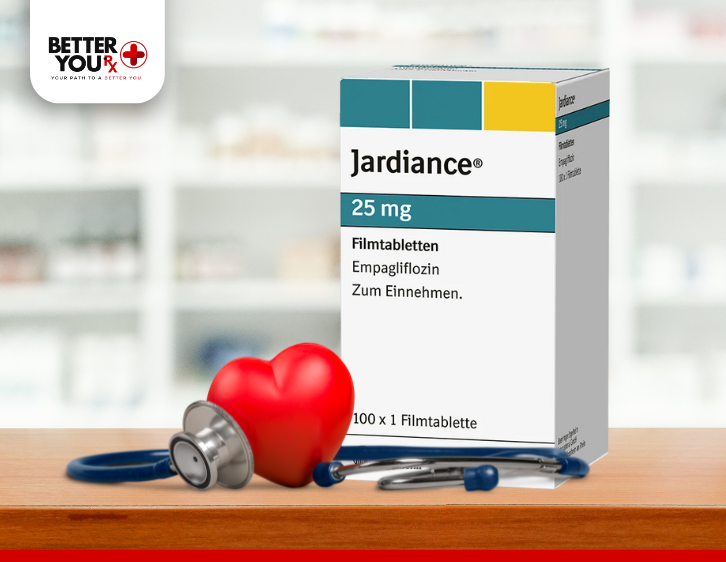Jardiance, also known by its generic name empagliflozin, is a prescription medication primarily used to manage Type 2 diabetes. By helping control blood sugar levels, Jardiance plays a crucial role in reducing the risk of serious complications like heart disease and kidney damage. However, what has piqued the curiosity of many is its potential side effect—weight loss. Could this diabetes medication offer a solution for those struggling to shed extra pounds? Let’s explore the science behind Jardiance, its impact on weight, and what patients should know before considering it.
Understanding Jardiance and How It Works
Jardiance belongs to a class of medications called sodium-glucose co-transporter 2 (SGLT2) inhibitors. These drugs work by targeting the kidneys to prevent the reabsorption of glucose into the bloodstream. Instead, excess sugar is expelled through urine, helping to lower blood glucose levels effectively. This mechanism not only aids in managing diabetes but also indirectly influences body weight.
When glucose is expelled from the body, calories are lost in the process. Over time, this calorie loss can contribute to modest weight reduction. Jardiance is primarily prescribed to improve blood sugar control and reduce cardiovascular risks, but its weight-related benefits have drawn significant attention, even among individuals without diabetes.
Exploring the Link Between Jardiance and Weight Loss

The connection between Jardiance and weight loss stems from its unique way of lowering blood sugar. Unlike other diabetes medications that can lead to weight gain, Jardiance takes an opposite approach. By excreting sugar through urine, it effectively reduces calorie retention, which can result in a slight decrease in weight over time.
Clinical research indicates that individuals taking Jardiance may experience moderate weight loss. On average, individuals may lose anywhere between two to four kilograms (approximately four to eight pounds) over a few months. This reduction might not seem dramatic, but for people managing Type 2 diabetes or those who struggle with insulin resistance, even small weight changes can have a significant impact on overall health.
Interestingly, Jardiance also appears to influence how the body processes fat. While its exact mechanism in this area is still being studied, researchers believe it may affect metabolic pathways that contribute to fat storage and energy expenditure. However, it’s important to note that the weight loss effects of Jardiance vary widely among individuals and are not guaranteed.
Who Is Likely to Experience Weight Loss?

The extent to which Jardiance impacts weight often depends on individual factors such as baseline glucose levels, diet, lifestyle, and genetic predisposition. For patients with uncontrolled diabetes and high blood sugar levels, the calorie-losing effects of Jardiance are typically more pronounced. This is because higher sugar levels result in more glucose being expelled from the body.
In some cases, individuals without diabetes who use Jardiance off-label have reported weight loss. However, healthcare professionals caution against using the drug solely for this purpose, as its primary role is to address blood sugar imbalances and cardiovascular health, not weight management.
While Jardiance can be an effective tool for weight reduction in specific cases, it is not a magic solution. The results are generally modest and best achieved when the medication is combined with a balanced diet and regular physical activity. Additionally, other factors such as age, hormonal balance, and overall health can influence how the body responds to the medication.
How Much Weight Loss Can You Expect?
On average, patients using Jardiance as part of their diabetes management plan may experience weight loss of around 2-3% of their total body weight. For instance, someone weighing 200 pounds might lose four to six pounds after consistent use over a few months. While these changes might seem small, they can still have a meaningful impact, particularly for individuals looking to improve insulin sensitivity or reduce cardiovascular risks.
It’s also worth noting that the weight loss associated with Jardiance tends to plateau after an initial period. This is because the body adapts to the calorie loss over time, and other factors such as dietary habits and physical activity levels play a more significant role in long-term weight management.
Potential Side Effects and Risks
While Jardiance offers several benefits, it is essential to be aware of its potential side effects. One of the most common effects is increased urination, as the medication encourages the body to expel excess glucose. This can sometimes lead to dehydration if fluid intake is not adequately maintained. Possible side effects include urinary tract infections, yeast infections, and, in rare instances, a serious condition known as ketoacidosis.
Patients considering Jardiance should consult their healthcare provider to assess their overall health and determine whether the medication is appropriate for them. This is particularly important for individuals with pre-existing kidney problems or those at risk for dehydration, as these conditions can exacerbate side effects.
Combining Jardiance with a Healthy Lifestyle

Although Jardiance can aid in weight loss, it is most effective when combined with a well-rounded health and lifestyle plan. For optimal results, patients should pair the medication with healthy lifestyle habits, including a balanced diet rich in whole foods, lean proteins, and healthy fats. Regular physical activity, such as walking, cycling, or strength training, can further enhance weight loss and improve overall health.
Jardiance may also help some individuals overcome the initial hurdles of weight loss by creating a caloric deficit. However, long-term success will largely depend on sustainable lifestyle changes rather than reliance on medication alone. For this reason, healthcare providers often emphasize the importance of viewing Jardiance as a supportive tool rather than a standalone solution.
Conclusion
Jardiance has garnered attention not only for its effectiveness in managing Type 2 diabetes but also for its potential to aid in weight loss. By promoting the excretion of glucose and calories, the medication offers a unique benefit for individuals seeking to improve their metabolic health. However, its weight loss effects are generally modest and vary from person to person.
For those considering Jardiance, it’s crucial to consult a healthcare professional to understand the medication’s benefits and risks fully. By combining Jardiance with a healthy lifestyle, individuals can maximize its potential and achieve lasting improvements in both weight and overall health. Ultimately, while Jardiance may offer an added boost, sustainable weight loss requires a balanced approach that prioritizes long-term well-being.



